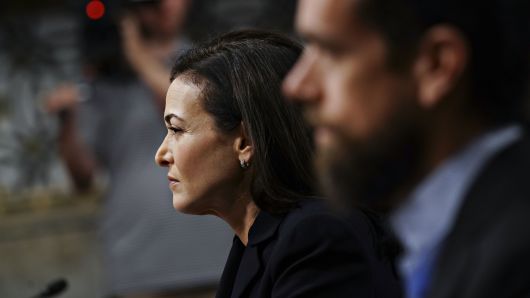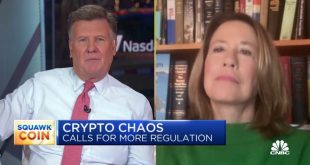
Andrew Harrer | Bloomberg | Getty Images
Sheryl Sandberg, chief operating officer of Facebook Inc., left, listens during a Senate Intelligence Committee hearing in Washington, D.C., U.S., on Wednesday, Sept. 5, 2018.
We are at a consequential juncture in the technology business and in society.
A handful of tech giants have become the guardians of global speech, amplifying certain kinds of voices and limiting others according to their own bespoke, often opaque and shifting standards. Although these companies — Facebook, Google and Twitter above all — are now integral to just about every corner of our lives, they face little regulatory oversight in the United States. It was only after the last presidential election that lawmakers even began expressing interest in the companies’ power.
And yet, against the scale of the issues involved, the congressional hearings held so far about the companies and their clout have often felt petty, misinformed and sharpened for political point-scoring. And President Trump’s assertion last week that Twitter, Facebook and Google are biased against conservatives only raised the stakes.
So when Jack Dorsey, Twitter’s chief executive, took the hot seat in front of the House Energy and Commerce Committee on Wednesday, I worried we would spend the bulk of the time talking about conspiracy theories peddled by the provocateur Alex Jones. Surprisingly, that was not the case.
Even though Mr. Jones did show up to make a spectacle in the halls of Congress, the hearings in the House and the Senate — which, in addition to Mr. Dorsey, included Sheryl Sandberg, Facebook’s chief operating officer in the Senate session — were for the most part serious and substantive. They touched on some of the deepest tech policy issues, and allowed executives to explain in depth the difficulties of managing their networks, and where and how they have failed to do so.
The hearings did not devolve into what many feared — a parade of ham-handed apologies from the executives for trying to police their networks in ways that affected certain political viewpoints. Although Mr. Dorsey apologized for an algorithmic bug that resulted in the disappearance of hundreds of thousands of users from Twitter’s follower-suggestion box this year, neither he nor Ms. Sandberg was prepared to genuflect toward cheap claims of bias.
More from The New York Times:
Republicans Accuse Twitter of Bias Against Conservatives
Jeff Bezos’ First Major Political Donation Is $10 Million to Elect Veterans
Workout Machines Get a Silicon Valley Upgrade. But Is the Price Right?
A cynic might point out that the hearings arrived at few solutions to the thorny problems they raised. Yet in highlighting the complexities of their systems, Mr. Dorsey’s and Ms. Sandberg’s testimony helped underscore the difficulties lawmakers will face in figuring out ways to ensure that tech companies are guarding people’s political freedoms and privacy while protecting their services from those who would spread misinformation and propaganda.
Contrary to much of what is happening in Washington these days, Wednesday’s tech hearings showed a political system earnestly wrestling with issues for which there are no easy answers. They also showed two companies, whether out of embarrassment or fear or brand management, seriously engaging with lawmakers’ worries and guiding them though the thicket of issues involved.
But what about the third company, Google? And what about the big question: Are these hearings leading toward anything like a workable tech-policy solution to regulating how tech companies operate?
Let’s try to answer them.
 EU News Digest Latest News & Updates
EU News Digest Latest News & Updates



